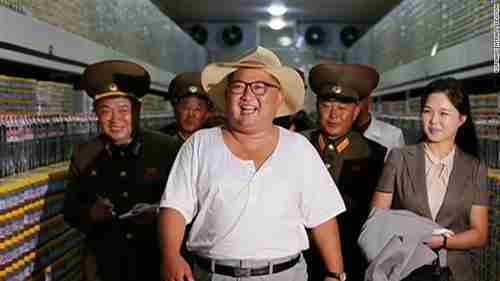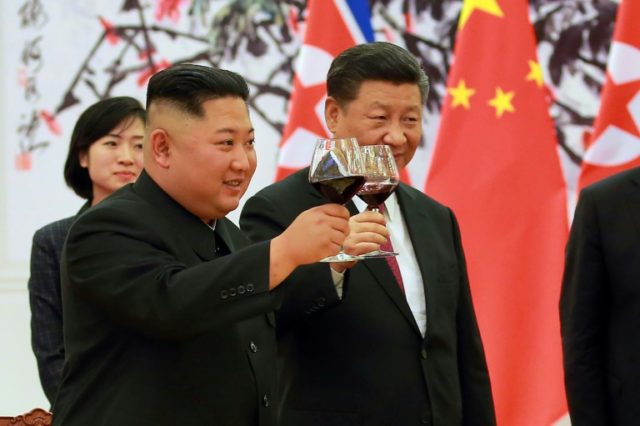This morning’s key headlines from GenerationalDynamics.com
- U.S. imposes new North Korea sanctions on Chinese and Russian shipping companies
- Profound connection between the sanctions on Turkey and North Korea
U.S. imposes North Korea sanctions on Chinese and Russian shipping companies

North Korea’s child dictator Kim Jong-un in a tee shirt, frolicking with his wife Ri Sol-ju and his army generals
As the weeks and months go by with no progress on North Korean denuclearization, harsh sanctions imposed by the United Nations and the United States remain imposed on North Korea. These sanctions were imposed months and years ago, and remain in effect because of North Korea’s development of nuclear weapons and ballistic missiles. However, these sanctions have been weakened in the last couple of months because China, Russia, and other countries have clandestine ways to conduct trade with North Korea in violation of the sanctions.
The U.S. on Thursday announced new sanctions targeting shipping and trading firms based in China, Russia, and Singapore. These firms have been active in violating the sanctions. According to the announcement issued by the Treasury’s Office of Foreign Assets Control (OFAC):
OFAC designated China-based Dalian Sun Moon Star International Logistics Trading Co., Ltd. and its Singapore-based affiliate, SINSMS Pte. Ltd. These companies worked together to facilitate illicit shipments to North Korea using falsified shipping documents, including exports of alcohol, tobacco, and cigarette-related products. The illicit cigarette trade in North Korea reportedly has netted over $1 billion per year for the regime. SINSMS Pte. Ltd. is responsible for exports to North Korea and general trading of items from China, Singapore, Hong Kong, Thailand, Vietnam, Indonesia, and Cambodia. Employees at SINSMS Pte. Ltd. also provided information on how to evade shipping restrictions by sending cargo SINSMS Pte. Ltd. to Nampo, North Korea, via Dalian, China.
OFAC also designated Russia-based Profinet Pte Ltd. (Profinet) and its Director General, Russian national Vasili Aleksandrovich Kolchanov. Profinet is a Russian port service agency that provides loading, bunkering, supplying, and departure arrangements for vessels calling at the Russian ports of Nakhodka, Vostochny, Vladivostok, and Slavyanka. Profinet has provided port services on at least six separate occasions to DPRK-flagged vessels, including the sanctioned vessels CHON MYONG 1 and RYE SONG GANG 1, which have carried thousands of metric tons of refined oil products. Profinet continued to offer its bunkering services to DPRK-flagged vessels even after its employees knew of oil-related sanctions on North Korea. Kolchanov was personally involved in North Korea-related deals and interacted directly with North Korean representatives in Russia.
Russia’s foreign ministry said that fresh sanctions could undermine the peace process in North Korea. The ministry also said that Washington “is not aware” of how the “utmost pressure” on North Korea is “fraught with danger,” without specifying what danger they had in mind. According to the statement:
The destructive U.S. tactics, pursued beyond the framework of the U.N. Security Council and its 1718 Sanctions Committee (related to North Korea), is only able to undermine the progress, which has been made recently toward the settlement.
Nobody seriously believes that North Korea has discontinued development of nuclear weapons and ballistic missiles, short of testing them. And indeed, why should they stop development?
As we recently reported, a United Nations report says that during the last six months, not only has North Korea not stopped development of nuclear weapons and ballistic missiles but, even worse, North Korea is stepping up plans to sell weapons to other countries, including to the Houthis in Yemen.
As I have been writing for many months, based on Generational Dynamics analyses, there is no chance whatsoever that North Korea will give up its nuclear development program now or in the future, after having tortured, starved, and brutalized their own population for three decades, under the promise that one day North Korea would be a nuclear power peer with the United States.
North Korea has one and only one objective in the charm offensive since the beginning of the year and in Kim’s summit meetings with Trump and South Korean leaders: To get the U.S.-led sanctions lifted without having to give up its development of nuclear missiles targeting the United States.
Statements from the North Koreans have expressed increasing hostility toward the United States for not agreeing to lift the sanctions. Last week, North Korea’s foreign ministry issued a statement saying that the North has worked to improve relations between the two countries and “make active contributions to peace, security, and prosperity on the Korean Peninsula and over the world.” The statement added:
[U.S. officials] are making baseless allegations against us and making desperate attempts at intensifying the international sanctions.
…
As long as the U.S. denies even the basic decorum for its dialogue partner and clings to the outdated acting script which the previous administrations have all tried and failed, one cannot expect any progress in the implementation of the DPRK-U.S. joint statement including the denuclearization.
The North Koreans have used the phrase “step by step” to describe how they would like the process to go, meaning that they take some step, and then the U.S. takes some step – removing some of the sanctions.
The North Koreans have demolished two test sites, but it is widely believed that they were no longer needed, anyway. Nonetheless, the North Koreans have expressed anger that these meaningless steps were not reciprocated by reducing sanctions.
What the U.S. negotiators have requested from North Korea is a complete list of all their nuclear and missile development and test sites, and to permit the process of United Nations inspections of all these facilities. The North Koreans have flatly refused.
So really nothing has changed since the beginning of the year except that the North Koreans have advanced the nuclear weapons and ballistic missile development by another eight months.
The Kim Jong-un administration has said in the past that nothing will stop them from developing an arsenal of nuclear missiles aimed at the United States. The Trump administration has said repeatedly that would not be allowed. This is similar to the ancient theological puzzle of what happens when an irresistible force meets an immovable object. At some point, there will be an explosion. AP and US Treasury and Reuters
Related Articles:
- John Bolton and Marco Rubio describe North Korea strategy, as sanctions are violated (06-Aug-2018)
- North Korea appears to dismantle its Sohae satellite launch site (26-Jul-2018)
- After the Kim-Trump summit, US and N. Korea plan denuclearization details (14-Jun-2018)
- NY Times publishes a generational analysis of South Korea (30-Jan-2018)
Profound connection between the sanctions on Turkey and North Korea
On Thursday, U.S. Treasury Secretary Steven Mnuchin doubled down on sanctions against Turkish officials for their refusal to free Christian pastor Andrew Brunson, who was arrested in 2016 on what the U.S. claims are trumped up charges.
We put sanctions on several of the Cabinet members. We have more that we’re planning to do if they don’t release him quickly.
It has been somewhat startling to see the harsh reaction by the Trump administration over this one particular issue – the release of pastor Brunson – when there are so many other disagreements, including other Americans being held hostage, that are not causing a similar reaction.
The reason, as we explained last week, is that in the particular case of Brunson, Turkey’s president Recep Tayyip Erdogan had a friendly meeting with Donald Trump early in June, and after Trump left that meeting believing that they had made a deal: Trump would convince Israel to release a Turkish citizen, and in return Turkey would release Brunson. The Turkish citizen, Ebru Ozkan, was in fact released, but Brunson was not.
So from the point of view of the Trump administration, this is not an ordinary disagreement. They had a deal, Trump kept his part, Erdogan reneged.
At its core, this is similar to the situation with North Korea. Trump met with North Korea’s child dictator Kim Jong-un in Singapore, and they had a written agreement for North Korea to denuclearize on a step-by-step basis. Trump did, in fact, take an important step on the U.S. side by canceling military drills with the South Koreans. So from Trump’s point of view, he is performing his part of the deal, and Kim is reneging.
This is a serious matter because these two situations are in lockstep. If Erdogan can renege on a promise, then Kim can do the same, and vice-versa. From Trump’s point of view, this is certainly an important factor in the Art of the Deal.
Turkey is in the middle of a currency crisis that began long before the Brunson issue was raised and the sanctions were imposed. Erdogan says that interest rates are evil and insists on personal control of Turkey’s central bank. The result is double-digit inflation and the value of the lira crashing against the dollar and other currencies, and this has had a knock-on effect on other developing country currencies, as investors rush to the safety of U.S. Treasuries.
Last year, Turkey rushed to support Qatar when it was blockaded by Saudi Arabia, and now Qatar is returning the favor by pledging $15 billion dollars. The lira rallied briefly on the announcement, then began to fall again. Qatar’s money will help Turkey buy time, but the core problems with the central bank will have to be fixed quickly. Bloomberg
Related Articles:
- Turkey’s lira currency crumbles as Trump turns the screws after Erdogan double-cross (11-Aug-2018)
- Turkey’s government takes control of last remaining independent news source (23-Mar-2018)
KEYS: Generational Dynamics, North Korea, Kim Jong-un, China, Russia, Singapore, Steven Mnuchin, Turkey, Recep Tayyip Erdogan, Ebru Ozkan, Andrew Brunson
Permanent web link to this article
Receive daily World View columns by e-mail

COMMENTS
Please let us know if you're having issues with commenting.